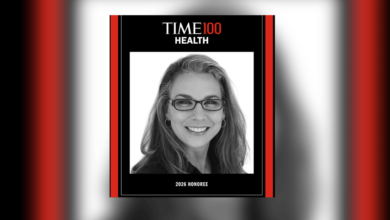Nurses ‘vital’ in push to improve cervical screening rates

The NHS in England has renewed efforts to get more women attending cervical screenings, as large numbers of younger people continue to not attend when invited.
According to NHS England figures, as of December 2023 more than a third of eligible women aged 25-49 did not book a cervical screening when invited to.
“The key message for all nurses to promote is that screening saves lives”
Jessica Turner
The figures showed that, nationally, the latest screening rate of 65.8% for quarter three of 2023-24 for this age group was a decrease from 67.1% over the same period in 2020-21.
In response, the health service is emphasising the importance of taking up the offer.
This new push forms part of its strategy to meet the goal of eradicating cervical cancer by 2040.
Cervical screenings, often performed by nurses, check for human papillomavirus (HPV), which causes around 99% of all cervical cancers.
Speaking to Nursing Times, Jessica Turner, Royal College of Nursing (RCN) public health professional lead, said nurses were crucial to achieving the higher rates of attendance for cervical screenings which the NHS is seeking.

Jessica Turner, RCN public health professional lead
The NHS estimated that in 2022-23, 3.43 million people attended a screening out of the 4.62 million people aged 25-64 who were invited for one.
“Nurses need to ask the question, whatever role they’re in,” Ms Turner said. “‘Are you up to date with your vaccines? Are you up to date for screening? Here’s some information on the NHS website of what you’re entitled to.’
“The key message for all nurses to promote is that screening saves lives. It is ultimately an individual choice, but we play a vital role in informing people and educating them on the pros and cons of screening so that they can make an informed decision.
“We know that can be difficult, we know that there can be time pressures on conversations that we’re having with people, but if you do have capacity to just introduce screening into a conversation, you could be that difference between somebody taking that offer or not.”
Ms Turner acknowledged that, as the NHS statistics also showed, there were wide regional variations in the response rate to invitations for cervical screenings.
“It’s very complex, and it’s very different in different communities,” she said.
“[It could be] something as simple as it just not being their norm for whatever reason with their families; their aunties, their mums might not have gone for screening.
“So actually, it’s just not something that they’ve done. So that’s where education is really key.
“You could be, as a nurse, the first person that spoke to somebody about cervical screening, they might have received the letter, but might not have had the confidence to book that appointment. It’s important to make every contact count.”
She said that nurses could also aid with boosting rates by ensuring patient groups who may fall through the cracks for cervical screenings, such as transgender men or non-binary people, were aware of the offer.
Ms Turner explained that, from experience working for years in a health promotion nursing role, many people were not even getting the screening invitations because they are not registered with a GP.
Nurses, Ms Turner said, also had a responsibility and the means to remedy this: “It’s really important that populations and people are registered with a GP and there can be lots of reasons that’s not the case, you might have recently moved house, you may be a student, etc.
“So nurses are vital to that. It might be that you come into contact with a patient in an A&E department, for example, and you might pick up that they’re not registered with a GP.
“By you having a conversation with them, you could be the prompt that means that they register, and then they’re on the roll to be invited for things like screening, as well as lots of other reasons why it’s important to be registered.”
NHS England national director for vaccinations and screening Steve Russell added: “We have set an ambitious target of eliminating cervical cancer within the next two decades – one of the few countries in the world who have committed to this.
“We are doing everything we can to achieve our ambition by making it as easy as possible to make appointments, and continuing to send invites and reminders to all eligible women.
“But in order to make this a reality we need to see more women coming forward for their cervical screening appointments when invited.”
The health service has also encouraged women who are eligible to get an HPV vaccination, as part of its 2040 eradication goal, and, last year, implemented measures and a push to increase uptake.







